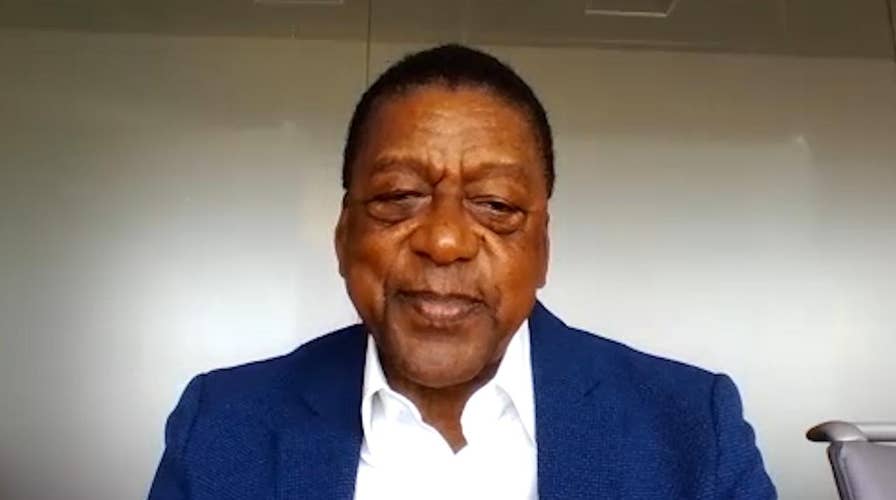BET founder Robert Johnson explains his Big Idea of $14 trillion in slavery reparations
Johnson says 40 million African Americans should each receive $350,000 to atone for slavery and to close the wealth gap with white Americans.
The Big Idea is a series that asks top lawmakers and figures to discuss their moonshot — what’s the one proposal, if politics and polls and even price tag were not an issue, they’d implement to change the country for the better?
Robert Johnson, the founder of Black Entertainment Television, says it's time America atones for slavery and systemic racism by paying African-Americans reparations to make them economically equal to white Americans.
Johnson, the first black billionaire in the United States, has put a price tag on the debt America owes to African-Americans at $14 trillion.
BET FOUNDER ROBERT JOHNSON SAYS DEMS TAKING BLACK VOTERS 'FOR GRANTED,' CALLS FOR BLM TO FORM PARTY
"Nobody talks about cash, but black people understand cash," Johnson told Fox News.
Under his proposal, an estimated 40 million African-Americans would get $350,000 in direct cash payments over 30 years (costing the average taxpayer roughly $2,900 a year, according to his office). The $350,000 would signify the wealth disparity between African-Americans and white Americans.
To say this is controversial is an understatement. Some Democratic lawmakers have warmed to the discussion, but often in the form of commissions and other partial measures. A Fox News poll last year found most Americans are opposed to cash reparations. And with the government already spending trillions on coronavirus relief and the national debt pushing past $26 trillion, concerns about the country's fiscal stability would pose an obvious hurdle.
Senate Majority Leader Mitch McConnell, R-Ky., said last year of the idea: "I think we're always a work in progress in this country, but no one currently alive was responsible for that, and I don't think we should be trying to figure out how to compensate for it."
Johnson contends white Americans built generations of wealth on the backs of slave labor, and black people will never be able to catch up in wealth unless they are paid this debt.
"You want a big idea: white America, what would happen if you said, 'please forgive us and accept our apology. And by the way, we think we owe you what was taken from you for over 300 years of slavery, Jim Crow, segregation and denial of economic opportunity and rights," Johnson said.
"I think that would be a huge emotional assuaging of guilt."
Johnson, the founder of RLJ Companies, discussed his reparations proposal at length with Fox News this week. This Q & A has been edited for clarity and brevity:

Black Entertainment Television (BET) founder Robert Johnson says American owes African Americans $14 trillion in reparations. (Photo by Ron Adar/Getty Images)
Q: You’ve put forth a reparations plan that calls for $14 trillion in direct cash payments to descendants from slavery. Why do you think it's important for today's Americans to atone for the sins of the past?
Johnson: America from its inception has been plagued by the evils of slavery, so much so that this country fought a brutal civil war to try to settle the issue. Well, obviously, the issue was not settled after the Civil War. And this country has experienced continual racial violence, segregation and discrimination since that time. And as a country that has espoused ideas about freedom, individual rights, equal treatment under the law, everything in the Declaration of Independence and Constitution, and yet at the same time have this significant division between blacks and whites. Economically, socially, educationally -- all of these things are because America has never come to grips with its original sin of slavery, which has been responsible for most of the disharmony between blacks and whites in this country.
And therefore, I'm proposing that if America can atone for that in the form of cash payments to African-Americans to make them economically equal to white Americans, two things will happen. One, African-Americans will be, in effect, financially equal in a capitalist society and given the opportunity to grow wealth for themselves and their families. And two ... unless you can atone, forgive and then repair in the form of the $14 trillion of cash, which the way I've developed it would make 40 million African-Americans equal in wealth to white Americans, we will live with this problem for generations to come.
BET FOUNDER ROBERT JOHNSON MOCKS CROWDS PULLING DOWN STATUES, CALLS THEM 'BORDERLINE ANARCHISTS'
Q: Your plan calls for $14 trillion to be paid out to descendants of slavery over the course of 30 years. How do you get to that figure?
Johnson: It's simple math. If you look at it this way, the median white American family has about $350,000 of personal net worth. African-Americans have about 10 times less than that. So about, let's say, $30,000 of personal net worth of an African-American family. In order to make everything equal. You have to bring African-Americans equal to white Americans.
And the factors that we use to determine net worth are pretty simple. Your home is your most important asset for most middle-class people. African-Americans are way behind white Americans in homeownership. Income, i.e. salaries, are the next factor in wealth. African-Americans fall behind white Americans significantly in income, savings, investments in stocks and bonds, money to put your kids in school. When you take all these factors, you come up with the fact that the disparity of wealth is something that you need to close. So in order to close that -- to bring 40 million African-Americans, up to $350,000 of wealth. Well, you multiply that number -- $350,000 – times 40 million African-American descendants of slaves. You come out with $14 trillion. That money would be paid out over 30 years.
Q: Would this be a special reparations new tax that would fund this program?
Johnson: Ultimately, it's a debt owed by the taxpayers. And reparations is a debt owed by the nation as a whole because all of the wealth that was taken from slaves. Free labor is a transfer of wealth.
That wealth of slavery found its way throughout the creation of wealth in the United States. I've often said that slaves may have died but the money that they created did not die. Money doesn't die. Money not only circulates; money multiplies. If you gave me a group of the brightest forensic accountants, I would be willing to bet you that I could trace every dollar of wealth in the United States today back to slavery.
REP. TIM RYAN'S BIG IDEA: GIVING AMERICANS A MENTAL TIMEOUT
The $350,000 would be paid on average $10,000 to $11,000 per year for the next 30 years to each African-American descendant. Let's assume there are 170 million people who pay taxes in the U.S. If you break it down by days, it comes out to American taxpayers paying about $8 a day in reparations.
Now, anticipating the question, what about poor whites who may not have that money to pay into the reparations program? Well, we could do it like we do other taxes. It could be a progressive tax. So those white Americans with more money would pay more, like the income tax. Those white Americans with less money would pay less. And by the way, African-Americans would also pay tax on this because it's a responsibility of the nation. And we're not exempting African-Americans from paying that tax, even though they are the recipients of the damages, just as if you were to get damages awarded by a court today. The court wouldn't say, well, you have damages coming, you don't have to pay taxes. You have to pay taxes.

Robert L. Johnson, BET Founder, at BET's 25th Anniversary. (File photo by L. Cohen/WireImage for BET Network)
Q: And how do you envision these direct cash payments being distributed? And how would you determine who is eligible for the payments?
Johnson: The eligibility is any African-American, black American, who is a direct descendant of slaves. So that's fairly simple.
And the definition of who's black. We simply use the slave era definition of black. And back in slavery days ... if you had one drop of blood in you that was black you were determined to be black. You were treated as black. So we'll use that same model.
The money would come out of the taxpayers’ pockets. ... So that money would be transferred in the form of a cash payment to every African-American. It's sort of like Social Security. They send you a check.
Q: There’s been some reparations proposals in Washington. Sen. Cory Booker, D-N.J., has a bill that would establish a commission to study the impact of slavery and continuing discrimination against African Americans and then make recommendations on reparation proposals. In the House, Rep. Sheila Jackson Lee, D-Texas, authored the companion legislation. Do you support these efforts? Have you talked to them about these plans?
Johnson: I know about them and I know Sheila Jackson Lee and I know Cory, but no, I have not talked about them. And fundamentally, the reason I haven't talked about them is because they are going nowhere.
There is no need to study reparations or slavery. You can go to Google and you could have within an instant, hundreds of thousands of articles, literature, studies, on reparations and slavery. To me, this is rearranging the deck chairs on a racial titanic. It's not going any place.
REP. RO KHANNA'S BIG IDEA: BRINGING SILICON VALLEY JOBS TO RURAL AMERICA
The Democrats will never, ever vote for any reparations involving cash payments to descendants of slaves. They will never do it. And what they will do is what they have always done, which is paternalistic programs managed by bureaucrats to give support -- somewhat means-tested support -- in the black community. And call it a day. That's it. I guarantee you that's what will happen with this study. Because that's what this government ... is comfortable with: giving money to hopefully well-meaning bureaucrats to supervise money going to help black people.
If you're going to close the wealth gap, there are only two ways to do it. Either you've got to stop white people from getting wealthier, which you’re not going to. Or you got to make black people wealthier.
The only way you are going to do it is if you give them cash. Programs don't do it.
Q: How would you know if this program has been successful? Would you gauge it from an economic standpoint where you see the wealth gap lessen or be closed?
Johnson: You would obviously gauge it by closing the wealth gap. That's fairly simple because what happens when you have wealth, you do the things that white Americans have done from the time they first arrived here. They bought homes. They started businesses. They sent their kids off to college. They saved. They invested. And all of a sudden they accumulated wealth. African-Americans were denied that opportunity.
SEN. JOSH HAWLEY’S BIG IDEA: ALLOW AMERICANS TO SUE BIG TECH FOR SELECTIVE POLITICAL CENSORSHIP
The second part is really up to white Americans. Will white Americans say to themselves, 'we have atoned for an original sin. And not only that, we have made 40 million African-Americans whole for what was done to them through no fault of their own. They were dragged here on ships to be slaves. Not even people. Property. And we took advantage of the labor that they created and used it to build our wealth. Now we're saying we want to atone.'
If white people see this as a way of saying in a huge way, I apologize. I'm sorry. I can assure you there are no more forgiving people on the face of the Earth than African-American people.






















